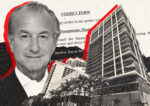When Rasikaran and Jhansi Boaz set out to buy a condo in 2008, they chose an oceanfront Canyon Ranch-branded project in Miami Beach, partly thanks to its amenities. The complex, now called Carillon Miami Wellness Resort, has four pools, a spa and restaurant.
“We liked that healthy living concept,” Rasikaran Boaz said.
But their dream, and that of other buyers, of a relaxing lifestyle with regular spa visits and pool laps has turned into a nightmare.
Carillon condo owners have been locked in a yearslong lawsuit with an affiliate of Z Capital Group, which owns the hotel and amenities. At condo-hotels, such portions are collectively referred to as the commercial lot.
At issue is the degree of power Z Capital, a New York-based private equity firm led by James Zenni Jr., has at the Carillon. That includes over maintenance and assessments of amenities and common areas, such as elevators and hallways.
In January, a Miami judge sided with condo owners and wrote in his order that Z Capital’s level of control amounted to “overreach” that reduced residents to “long-term hotel guests.”
The order’s ramifications are expected to resonate across the sector. If the ruling becomes precedent, it would strip condo-hotels’ commercial lot owners from a level of control they have enjoyed, and in turn, could have a chilling effect on hotel buyers’ appetite to invest in projects altogether, experts say.
“This ruling,” said Peter Zalewski, a South Florida real estate analyst, “could be a watershed moment.”
Quid pro quo gone bad
The Carillon isn’t the only condo-hotel where the commercial lot owner — rather than residents — has more authority.
Most condo-hotels vest maintenance and assessment control over nearly the entirety of the properties with the commercial lot owners. And unit buyers willingly give up autonomy in exchange for living in a complex that feels and looks like a resort.
“Since condo buyers are getting the benefit of, say, a St. Regis, St. Regis has to have the ability to dictate what the interior of those projects looks like,” said real estate attorney Joe Hernandez. “There’s some quid pro quo there.”
Issues arise when residents feel commercial lot owners are levying excessive assessments, but aren’t maintaining the complexes.
The 580-unit Carillon, at 6801 Collins Avenue, has had financial woes from the start. In 2008, Eric Sheppard of WSG Development completed the North and South condo towers and revamped the Central Tower, which has the hotel keys and condo units that owners can rent out through the hotel. After Sheppard lost the project to lender Lehman Brothers in 2009, Z Capital bought it out of bankruptcy in 2015.
Some residents The Real Deal spoke with recalled high assessment hikes that started before the bankruptcy sale. Most recently, they are taking issue with the condition of amenities and an April letter informing them of monthly assessments of $1,800 to $7,700 per unit this year for improvements.
Regardless of whether condo-hotels are well run and assessments are fair, declarations that give commercial lot owners “unilateral” control are illegal, said Eugene Stearns, an attorney representing Carillon condo owners.
“A good autocracy might be acceptable,” he said. “If the dictator is benevolent, people will accept it. Doesn’t make it lawful, but people will accept it…. What we have here is a non-benevolent dictator.”
The Florida Condominium Act applies to condo-hotels, meaning that after a certain number of units are sold, residents take control of the property. “They are a condominium,” Stearns said. “It looks like a duck, walks like a duck and quacks like a duck.”
Not so fast, says Brian Dervishi, an attorney for Z Capital’s affiliate.
He said the Carillon has been well-kept, winning accolades and experiencing a nearly $500 million increase in value since Z Capital bought it. Condo owners have powers, including to inspect financials, and the governing structure is perfectly legal, Dervishi argues.
”You take a parcel of land and you can divide it up and say, ‘This half is condo subject to [the condo act], and the other half is not condo and that’s not subject to’” the act, he said. “That’s recognized, and that’s the basis of all these developments over the last 30 [to] 40 years.”
The Carillon ruling is good news for residents at other condo-hotels who are unhappy with the commercial lot owners’ management. It gives them ammunition to file their own suits.
The order “provides clarity in similar situations,” said attorney Lauren Fallick. “This ruling also will provide some guidance to drafters of master declarations … especially to avoid an outcome that might be detrimental to the developer or commercial operator looking for profit, as well as to protect the condo unit owners.”
But if the Carillon case truly sets off a chain reaction where the balance of power at condo-hotels tips in favor of residents, then not only would investment in the commercial lots dry up, but hospitality brands such as Ritz-Carlton and St. Regis may steer clear from this market.
Leaflet map created by Adam Farence | Data by © OpenStreetMap, under ODbl.
“If the hotel sees its power stripped away to control the common areas, the look of the buildings, maintenance fees,” said Zalewski, “you would probably see these name brand hotels disappear because there wouldn’t be a financial incentive to play ball.”
Careful what you wish for
The power struggle between residents and commercial lot owners at condo-hotels goes beyond the Carillon.
A lawsuit filed by a unit owner at Icon Brickell is largely considered to have opened the door to similar litigation. The project includes a pair of condo towers and a third tower with both condos and the W Hotel in Miami’s financial district. In 2018, a resident at Tower 3 sued the association, arguing that the declaration violated the state condo act. It gives the W Hotel ownership and control of facilities such as pipes and ducts, but leaves residents with the tab for these areas, the lawsuit said. The unit owner won the case.
But the Carillon order takes things further, potentially giving residents much more power than the Icon Brickell order did.
While the court is yet to specify the portions of the Carillon that unit owners can control, the condo associations are seeking a ruling allowing them to cancel spa fees if 75 percent of unit owners agree. They are also seeking to purchase the North Tower’s pools for market value, according to Stearns.
Yet Dervishi counters that taking over amenities could spell financial trouble for condo-hotels. Commercial lot owners often have mortgages on facilities such as pools and spas. If they lose those properties to the condo associations, it’s not as simple as substituting the name of the borrower on loan documents.
“To have a massive transfer of title of property not by consent or agreement, but by a court, would have a tremendous adverse impact, and the residents would also suffer,” Dervishi said.
In the very least, it could mean residents would become business operators at condo-hotels, Zalewski said.
“I would tell the owners of the Carillon they better be careful what they wish for,” he said, “because they have to figure out how the hell to manage a hotel.”
Coexisting
Unit owners merely want a say over maintenance and assessments alongside Z Capital, Stearns said.
“The critical issue in the future is changing the statute to figure out a way in which the commercial interest could have a seat at the table, reflective of their shared value of their interest, along with the owners,” he said.
Attorney Josh Migdal doesn’t believe that condo-hotels will be able to run appropriately if the courts essentially make residents partners in management decisions.
“Imagine a scenario where you are running a five-star luxury hotel, and you are redoing the tiling of the pool every few years, and you are making sure the lounge chairs have appropriate towels,” he said. “All of the sudden, every time you wanted to do something to the pool or to the lobby, you had to ask permission of the unit owners. And if you didn’t get the approval, you couldn’t do it.”
Read more


